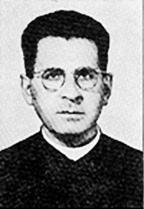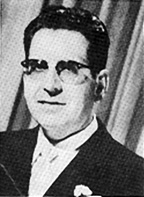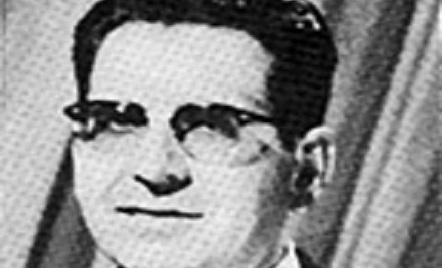New Life for a Jesuit Priest – José Rico
After nineteen years of continual, threatened shipwreck in the Roman Catholic priesthood, on the 15 of April 1956, I arrived on the tranquil shores of peace with God through Jesus Christ.
Among the reasons for leaving my native Spain was the call of American bishops in the face of the avalanche of Protestantism in Latin America. There is something in the soul of a Spaniard that makes him instinctively react against Protestantism. From the reign of Charles V and Phillip II onward, the history of Spain is full of religious episodes, battles, decrees of faith, and the Inquisition. Everything that forms a part of Spanish “Quixote” life reaches an extreme climax in its hatred of Protestantism. Thus, when the Pope told the Spanish clergy that Latin America is the mission field for Spanish priests, it was for me a clarion call. Coupled with this reason was my desire to labor in that part of the world, which, even though unseen, I loved, because it had been the most precious possession of our empire.
I soon learned that Latin America is a new and different world in every sense of the word. In Sao Paulo, Brazil, later in the Argentine, and finally in Chile, I saw the Protestant chapel alongside the Catholic Church, claiming right of social recognition. From my prejudiced viewpoint, I felt that this was an intolerable abuse. Nevertheless, the Divine Providence was soon to bring light to my mind on all this.
“He Which Hath Begun a Good Work…”

I arrived in Antofogasta, Chile, where, as a priest of the Cathedral, I found excellent opportunities to exercise my anti-Protestant ideas. I was ready to commence my fight when Evangelical literature began to reach me. I read it with disgust. Later, I read some Protestant books that I had dared to place in my private library. Little by little a current of sympathy began to replace the mortal hatred that I had up to that time against Protestantism. I saw clearly that Protestantism is not what it is said to be, not what it is taught to be in the Roman Catholic theological halls of learning. The Evangelical books were full of profound teaching drawn from the holy books of the Bible. Between them and the Catholic books, there existed no difference that I could see, other than that they lacked the imprimis potest of the Roman-approved books, but when it came to the lives of the Evangelical believers, there was a notable difference between them and the average Catholic. I would have desired that my faithful adherents live as morally and correctly as those hated Protestants.
Unforeseen circumstances took me from Chile to Bolivia. A few months later, I was appointed to the honorable position of National Counselor of the Catholic Student Organization, called the J.E.C. The nomination was made and signed by the archbishop of La Paz. I came in touch with the best Bolivian people, that is to say, with the marvelous young people of the J.E.C. They surged with abundance of life and enthusiasm, a snowballing force within the ranks of Catholic Action. My heavy responsibilities retarded for a time the change that had commenced in my soul towards Protestantism. Yet, God continued the work that He had started, and I not only had the opportunity to get acquainted with Evangelical books and tracts, but also to meet some strong Evangelicals.
Christ by Himself Purged Our Sins
My Catholic faith and priesthood were close to irreparable shipwreck. I wanted to make some supreme effort to save them. Could it not be that all this was a diabolic temptation like similar cases I had heard of? I wrote a book called, The Priest and the Host, which, though not published, had the official approbation of the diocese. I went to the Epistle of the Hebrews for inspiration in writing the book, and I did not find there the Catholic priesthood that I was looking for. The only priest spoken of was Jesus Christ, who “…once in the end of the world hath he appeared to put away sin by the sacrifice of himself” (Hebrews 9:26). Then I read in Hebrews 10:17-18 of the impossibility of another offering for sin. How is it that from the Roman Catholic pulpits it is preached that the Mass is the bloodless renewal of the very sacrifice of the Cross—if this epistle teaches that there is no possibility of repeating that which Christ did once and for all? And of what value is a bloodless sacrifice if the same writer teaches that “…and without shedding of blood is no remission” (Hebrews 9:22)? For this reason he says that having accomplished eternal redemption, the Eternal High Priest of the New Covenant ascended on high where now He intercedes for us in the presence of God (Hebrews 1:3, 7:25).
When I finished studying the Epistle to the Hebrews, I felt that an invisible and omnipotent hand stripped me of my vestments and my priestly character. The only priesthood found was that recorded by St. Peter, “Ye also, as lively stones, are built up a spiritual house, an holy priesthood, to offer up spiritual sacrifices, acceptable to God by Jesus Christ” (II Peter 2:5). It is the same that is referred to in Hebrews, “By him therefore let us offer the sacrifice of praise to God continually, that is, the fruit of our lips giving thanks to his name” (Hebrews 13:15).
I then saw the uselessness and falsity of purgatory since the same writer tacitly says that Jesus Christ is our purgatory, by offering His Life on the Cross, “…when he had by himself purged our sins, sat down on the right hand of the Majesty on high” (Hebrews 1:3). If Christ purges our sins, how is it that souls that are saved now have to go to purgatory to be purified? What kind of purgatory do the Catholics have that is not once mentioned in the Bible?
After this, there only lacked the opportunity to reach the goal that with such clarity appeared in the distance. God intervened by putting me in touch with a young pastor whose natural intelligence was combined with a profound love for God and an extraordinary knowledge of the Scriptures. Samuel Joshua Smith was the director of the Indian Bible Institute in La Paz. This was my first real personal contact with a “heretic.” His conversation illuminated my mind, dispelled my doubts, and comforted my heart to the point of making it valiant.
Jesus is the Only Way
Christ became my “only” Savior, for none other had died on the Cross for me. He also became my “sufficient Savior” because His blood is all-powerful to wash my sins from my soul. How miserably the rites, ceremonies, and human traditions of Romanism had failed to cleanse my soul for God. It was only then that I understood what Jesus meant when He said: “Jesus saith unto him, I am the way, the truth, and the life: no man cometh unto the Father, but by me” (John 14:6). I asked forgiveness for having wandered for so many years in wrong paths, and I was determined to walk by that Way, which is Christ Jesus.
From that moment, I knew myself as a new creature in Christ Jesus (II Corinthians 5:17). I realized at the same time that God had justified me and lifted the enormous burden from my heart that had until that moment mercilessly weighed me down. Yes, I had “passed from death unto life.”
I still had to continue my normal activities in Romanism for two months. It was necessary to evaluate all the details before taking a definite step. Those months were the darkest days of my life, but God finally broke the cords that had held me prisoner for so long. One bright afternoon, I arrived at the Evangelical church in Miraflores, La Paz. I quickly took off my gown. Dressed in civilian clothes, I sat down to a cup of tea and entered into the simple, spiritual, intimate conversation with the brethren, feeling as though I had always known them.

In this manner, the curtain fell that put an end to the tragedy that had existed throughout my nineteen long years in the priesthood. “For I am persuaded, that neither death, nor life, nor angels, nor principalities, nor powers, nor things present, nor things to come, nor height, nor depth, nor any other creature, shall be able to separate us from the love of God, which is in Christ Jesus our Lord” (Romans 8:38-39).


